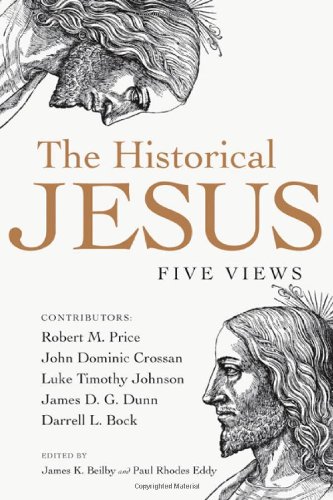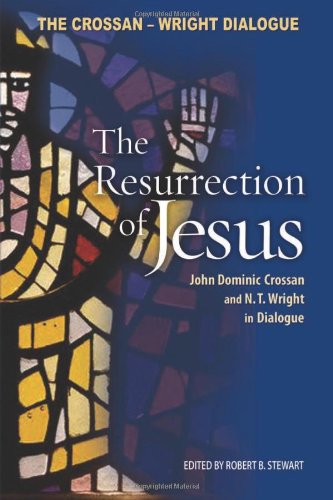John 1:1, The Logos
In the beginning was the Word, and the Word was with God, and the Word was God.
//This post may be most interesting to those Christians who don’t picture Jesus as divine. Or, at least, do not equate Jesus with God.
Most of the evidence in the Bible for Jesus’ divinity comes from the Gospel of John. In this Gospel, the Jews prepare to stone Jesus for claiming to be God. Thomas, upon seeing the risen Christ, proclaims “My Lord and my God.” A number of more subtle hints exist throughout the Gospel. But the most direct claim is obtained by combining verse 1:1 with verse 1:14. First, we read that the Word was God. Now we read that the Word means Jesus:
The Word became flesh and made his dwelling among us. We have seen his glory, the glory of the One and Only, who came from the Father, full of grace and truth.
Here, the word translated into “Word” is the Greek word logos, a word used nowhere else in the New Testament. It is the name stoics gave to the order of the universe, and the term Philo used to reconcile Stoicism and Judaism. John appears to have adapted this word to the Old Testament mystery of Wisdom, which appears often in personified form, especially in the Wisdom literature. Logos is the mind of God controlling this world, the force changing it from chaos to order, and since the time of Heraclitus in the sixth century B.C., it portrayed a philosophical line of thought known well by all learned men in the Hellenistic world, much as scholars might today discuss evolution or Einstein’s Theory of Relativity.
This logos is Jesus, John says. Is he being purposefully mysterious? Whatever he means by “logos”—and Johannine scholars will probably never agree—John clearly calls upon us to understand Jesus, and his relation to God the Father, in a new way.
Got an opinion? 0 commentsBook review: The Historical Jesus: Five Views
Edited by James K. Beilby and Paul Rhodes Eddy
★★★★★
Five noted scholars discuss what we can determine about the historical Jesus: Robert Price, Dominic Crossan, Luke Timothy Johnson, James Dunn, and Darrell Bock. It’s a wide range, from confirmed believers to one who argues that no historical Jesus existed at all.
Jesus scholarship continues to evolve, but it seems to me to be spiraling the target instead of zeroing in. For example, virtually all scholars now accept that Jesus was recognized by his contemporaries as a miracle worker and healer, while less trust is being placed in the “embarrassment criteria” that has prompted scholars to trust the Gospel of Mark above others.
The book is presented in debate style, and the contributors pull no punches. Each presents a short argument, maybe 30 pages long, and then each of the other four write a few pages of critique in response.
Like any good debate, it may leave you more confused than when you began, but if I must choose a “winner,” this time I pick the conservatives. (Please understand that, by “conservative,” I mean relatively so; Christianity within reason—rejection of critical scholarship is not a prerequisite to believing.) I’ve gained a new respect for Bock, and I was especially impressed by Dunn’s discussion of oral tradition. Dunn argues that it’s reasonable, once we capture in our minds the faith of the first followers of Jesus, to trace the Gospel writings back through normal oral transmission to Jesus himself, and suggests that the Gospels are not taken seriously enough by Jesus scholars. It is those who were so greatly impressed by Jesus that can give us the best glimpse of why they were impressed. He closes with this provocative conclusion: “Those who still experience the Jesus tradition as living tradition may well be best placed to appreciate the initial stages of the traditioning process, that it is the ear of faith which is likely to hear the Gospels most effectively, and that the living quality of the Jesus tradition is most likely to be experienced by those who in effect sit with these early assemblies in sharing their memories of Jesus and in seeking to live by them.”

Genesis 30:6, The Tribe of Dan
Then Rachel said, “God has vindicated me; he has listened to my plea and given me a son.” Because of this she named him Dan.
//Well, to be honest, it wasn’t Rachel’s son, but her handmaiden, Bilbah, who slept with Jacob and provided a son named Dan. One of the twelve sons of Jacob, one of the twelve tribes of Israel.
The tribe of Dan always seemed a bit of an outcast. They tolerated idols, and they were the only tribe not allowed into the New Jerusalem in Revelation. The hero of Dan’s tribe was Samson, who spent more time with the Philistines than he did the Israelites.
Some wonder if Dan was originally a tribe at all. The Song of Deborah sings about Dan dwelling on his ships, indicating a sea-going people, and maybe this provides a clue. The Philistines arrived in Canaan about the same time as the Israelites, and came by sea. Among the Sea Peoples arriving in Canaan were a group called the Danuna, possibly a remnant of the Greek Danoi, the people identified by Homer as the invaders of Troy. This group may have relocated inward from the coast, supposedly as a split-off, and carried Philistine pottery there with them. The theory posits that the tribe of Dan were chased north by the other Philistines and joined the Israelite confederation for protection.
Got an opinion? 6 commentsBook review: The Beast of Revelation
by Kenneth L. Gentry Jr.
★★★★★
I believe this is the book (I read the first version, before its reprint in 2002) that first introduced me to the preterist way of interpreting Revelation. This interpretation posits that most, if not all, of Revelation’s promises were fulfilled in the first century. I was utterly fascinated, and this book still holds a special place in my library.
The book is a condensation of a much larger work by Gentry: Before Jerusalem Fell. It’s broken into two parts. The first half is a description of Nero Caesar and how he fits the beast of Revelation to a T. The second half is an analysis of the dating of Revelation.
Gentry concludes Revelation was written before the great war of 70 A.D., when Jerusalem was destroyed and the Temple leveled by the Romans. I came to disagree with him, as you may know from my own book. Gentry describes his approach: “Holding to an unshakable conviction regarding Scripture’s divine inspiration, I also afford its inherent authority, infallibility, and inerrancy.” Well, there you go, of course a person who studies the first-century message of Revelation, and begins with the assumption that it prophesies the events it describes, would have to conclude that it was written beforehand.
Nevertheless, Gentry is an interesting writer with a fascinating message. That adds up to a very readable book, and earns it five stars.
Gentry, himself, remains for me an enigma who refuses contact. It’s possible I’ve offended him by contradicting his conclusions in my own book, but for whatever the reason, he won’t entertain, for debate or even discussion, theories that contradict his own interpretation. Because he pursues his scholarship in a bubble, his writings must be taken with a grain of salt, yet his perspective definitely deserves attention. This is a book I’m certain will make you think.

Jeremiah 25:27, Let’s Get Drunk!
This is what the LORD Almighty, the God of Israel, says: Drink, get drunk and vomit
//Thought maybe you could use a good Saturday night verse. Here you go; have a good time tonight, with God’s blessing.
Or have I aroused a bit of suspicion? Let’s read the verse again, in the context of the next few:
Then tell them, “This is what the LORD Almighty, the God of Israel, says: Drink, get drunk and vomit, and fall to rise no more because of the sword I will send among you.’ But if they refuse to take the cup from your hand and drink, tell them, ‘This is what the LORD Almighty says: You must drink it! See, I am beginning to bring disaster on the city that bears my Name, and will you indeed go unpunished? … The LORD will roar from on high; he will thunder from his holy dwelling and roar mightily against his land. He will shout like those who tread the grapes, shout against all who live on the earth.”
Still sound like fun? This is the doom saying of the prophet Jeremiah, about God’s own city. Jerusalem is about to be leveled, its people falling under the heavy yoke of Nebuchadnezzar, king of Babylon. This image provides the inspiration for the whore of Babylon in the book of Revelation, and those destined to “drink of the wine of God’s fury, which has been poured full strength into the cup of his wrath.”
The grapes of wrath. Still thirsty? Still planning to stop by the corner bar? Now in Revelation the wine turns into blood: “Then the angel swung his sickle on the earth, gathered its grapes and threw them into the great winepress of God’s wrath. They were trampled in the winepress outside the city, and blood flowed out of the press, rising as high as the horses’ bridles for a distance of 180 miles.”
Stay home tonight, guys. Please?
Got an opinion? 0 commentsBook review: The Days of Vengeance
by David Chilton
★★★★★
For those of you that read my review of Alan Bondar’s book (http://www.dubiousdisciple.com/2011/02/book-review-reading-the-bible-through-new-covenant-eyes.html) and yearned for more, here’s a book you absolutely must read. Chilton (1951-1997) is no stranger to preterist scholarship and first-century eschatology. I suspect this book sits on the shelf of every preterist researcher. And it should.
It’s not a quick read; over 700 pages. A comprehensive exposition, going verse by verse through Revelation, showing its relevance to first-century happenings. It is Chilton who quipped, “Not once did [John] imply that his book was written with the twentieth century in mind, and that Christians would be wasting their time attempting to decipher it until the Scofield Reference Bible would become a best-selling novel.”
Some of the analysis goes a bit deep; one of Chilton’s most important contributions is a long, convincing explanation of how rabbinic numerology would have recognized the number 666 already as the mark of both a king and a kingdom in the Dragon’s image. They also identified, from Daniel, the Roman Empire as the fourth and final kingdom before the end times. Then, lo and behold, along comes a Roman emperor (Nero Caesar) matching this very number!
Do you really want to understand why first-century Christians were so completely convinced of Christ’s impending return? Then this book is a must-read.

Exodus 6:3, El Shaddai
And I appeared unto Abraham, unto Isaac, and unto Jacob, by the name of God Almighty, but by my name JEHOVAH was I not known to them.
//Today’s topic is for all you Universalists out there. Sometimes the King James interpretation we are familiar with flat-lines the meaning of a verse so much that it becomes unnoticeable. This one is an example. What exactly is this verse saying? Let’s try reading it in the New International Version:
I appeared to Abraham, to Isaac and to Jacob as God Almighty, but by my name the LORD I did not make myself known to them.
Ouch, that’s even worse! God’s name, Jehovah (Yahweh), has become the generic LORD. How about the New Living Translation:
I appeared to Abraham, to Isaac, and to Jacob as God Almighty, though I did not reveal my name, the LORD, to them.
Sigh. We’re not getting anywhere. How do you “appear” as “God Almighty?” And who is the LORD? What is this verse really saying? Here’s a non-watered-down version of the original Hebrew:
I am Yahweh. I appeared to Abraham, to Isaac, and to Jacob as El Shaddai, but by my name Yahweh I did not make myself known to them.
Now we’re getting somewhere! So who is El Shaddai?
Answer: The “high god” of the Canaanites, the top fella, the almighty one above all other gods. Here we learn that the high god of the Canaanites before Israel arrived in force was Yahweh all along. The God of the Hebrews before there were ever any Hebrews. When he presented himself to the Patriarchs, he did so as the god of the Canaanites, and only later revealed himself also as the God of the Jews.
Got an opinion? 0 commentsBook review: The Resurrection of Jesus: John Dominic Crossan and N.T. Wright in Dialogue
Edited by Robert B. Stewart
★★★
When this book first appeared, I purchased it with great anticipation. Crossan and Wright are respected and respectful scholars, both with a reputation for digging deeply. But they sit on opposite sides of the fence.
To set the stage, there is no mention of an empty tomb in Paul’s writings, and the earliest Christian tradition contains no description of the resurrection itself. By the time the Gospels were written, it would have been very hard to certify what the tomb had contained. Tombs in that period were not permanent places of burial but only temporary places where the body decayed, leaving the bones, which were then either pushed to the back of the tomb or collected in ossuaries. In other words, no evidence existed to prove or disprove the claim of bodily resurrection by the time the claims were committed to writing.
Did it happen? How?
Wright believes in the bodily resurrection of Jesus and the empty tomb. He puzzles, as a historian, why anyone would continue to belong to the Christian movement in the first century and regard Jesus as the Messiah, unless the stories were regarded as literally true. Crossan, on the other hand, understands the resurrection as a metaphor for Jesus’ continued presence in the church. Bodily resurrection, to him, means “the embodied life of Jesus,” which continues to be experienced by believers today.
Sound like an interesting discussion? The dialogue between the two lasts all of 18 pages, and is rather uninspiring. The rest of the book contains commentary by other authors, where at least we appear to get a real peek into the minds of Crossan and Wright.
Disappointing.

Mark 1:4, Did Jesus Exist?
And so John came, baptizing in the desert region and preaching a baptism of repentance for the forgiveness of sins.
//In a recent forum, the topic came up of whether Jesus, the man, ever existed. Doubters point out the unlikelihood that any writer of the New Testament had ever met Jesus, and then point to the lack of reliable evidence external to the Bible. The external references that do exist are rare, and some, such as the famous Testimonium Flavianum passage by Jewish historian Josephus, where Josephus describes Jesus as the Messiah and tells how he rose on the third day, are universally considered forgeries.
Yet most New Testament scholars have little doubt about Jesus’ existence, based on the sheer volume of indirect evidence. Let me give you an example.
Virtually every scholar recognizes from the Bible that the Baptist movement and the Christian movement were in competition. And virtually every scholar recognizes the embarrassment of admitting that Jesus was initially a follower of John, and was even baptized by John. Mark’s Gospel hints that, like everyone else, Jesus approached John to be baptized “for the forgiveness of sins!” Yikes! No wonder the connection between Jesus and the Baptist is progressively downplayed in the Gospel accounts until, when we get to the final Gospel, John’s Gospel, Jesus isn’t even baptized!It’s safe to conclude that, if Jesus wasn’t baptized by John, there wouldn’t be a whisper of the whole embarrassing connection in any of the Gospels.
So, there you have it, one little indirect piece of the pie that helps scholars conclude Jesus was a real, living, breathing person.
Got an opinion? 0 commentsBook review: Reading the Bible Through New Covenant Eyes
by Alan Bondar
★★★★★
This is a very important book, and I beg all Christians to read it slowly. It might make you think differently, but there is nothing here to be afraid of, I promise.
I should confess up front that I asked for a review copy of Alan’s book because I have a deep interest in Christian eschatology (the study of the end times). I have written my own book about Revelation (http://www.thewayithappened.com/), and Alan and I both read the Bible more literally than most people. When the scripture says “soon,” we believe it means soon. When Jesus says “within this generation,” we believe Jesus meant his own generation. Yet, though we read the same words with the same literalness, we disagree—quite radically, I might add—about its message. Our two books are polar opposites. And here I am wholeheartedly endorsing Alan’s book. How can that be?
Question: Is the Bible the inerrant, inspired word of God? I personally don’t think of it that way. When I read the scriptures, I see multiple contradictions, differing opinions, human motives, outdated morals, historical inaccuracies, and blatant evangelizing. This is not to say I don’t consider the Bible the most influential and miraculous piece of literature in the history of the world; I do, and I’m greatly inspired by it. I just don’t read it as inerrant scripture.
My approach to interpreting scripture is sometimes called the historical-critical method. This method seeks to uncover the meaning and setting of each passage without resorting to supernatural suppositions. For example, Revelation refers directly to several events that happened during the Jewish war of 66-70 A.D. So, quite naturally, I conclude it must have been written after the war. How else could its author write about what happened?
There is a second way to read the Bible. If read through the eyes of a believer, one who finds that the Bible is prophetic and inerrant, then the logical conclusion is that Revelation could have only been written before the events it describes, since it seems to promote itself as prophecy.
Enter Alan Bondar’s book, Reading the Bible Through New Covenant Eyes. Another equally descriptive title may be Reading the Bible Through Believer’s Eyes. Bondar is a believing Christian who writes under the assumption that the Bible is both holy and inspired—and entirely written before the destruction of the Temple in 70 A.D. Now, I don’t often take sides like this in my book reviews, but I consider myself a scholar of Revelation and first-century eschatology, and here is my conclusion: If Bondar is right about the Bible’s inerrancy and traditional authorship (a big if, but I know many of you share this belief with him) then there is only one way to interpret the Bible as a whole, and Bondar has nailed it. His interpretation remains true to the spirit of urgency throughout the New Testament. Take this to the bank from an impartial judge (yeah, that’s me, the agnostic Christian): If the Bible is everywhere consistent, Bondar’s careful research has uncovered the most logical and contextual way to read it. Deep study of the Bible has turned him into a full preterist: a person who believes God’s promise of a new age, as described in books like Revelation, was fully realized in the first century.
Preterism is a branch of Christianity that believes most of the prophecies and covenantal promises have been fulfilled. Armageddon is over. Full Preterism, Bondar style, carries this to extremes: It’s all been fulfilled. Christ has already come back, the earth is not going to be destroyed, the general resurrection has happened.
Let’s get right to the dirt: Jesus promised he was coming back immediately. Futurists point out that Jesus never came back, and conclude he must not have really meant “immediately.” Full Preterists point out that Jesus clearly said “immediately,” many times in many ways, and conclude Jesus must have somehow already come back. Oh, and irritants like me point out that the writers of the New Testament could have been mistaken in their beliefs, but let’s ignore the irritants for now.
So, how and when did Jesus come back? What about the general resurrection? Has death been abolished as promised? Did the final judgment occur? These are all questions that Bondar answers with simplicity, consistent with the teachings of the Bible. Well, with one exception: I confess Alan Bondar’s explanation of the millennium, the thousand year reign of Christ, seems weak to me.
I was disappointed that this book does not discuss the external evidence of Preterism. That is, the events of 66-70 A.D. that map directly to the story in Revelation. But I’ve read several great Preterist books, and I’ll try to do a review on one or two in the near future. Besides, for Bondar to exhaustively argue his case would take a book twice the size of this one, and obscure its real value: that of bridging the misunderstanding of many Christians, that Preterism is some kind of wacky uprising to destroy one’s hope, and showing it to be just as “Christian” as orthodox beliefs.
Let me leave you with some advice: If you are content in your belief that the Bible is imperfect, read my book and don’t let Alan corrupt you. If you are a literal believer in the Bible, pick up Alan’s book and don’t touch mine with a ten foot pole. And if you are happy with your creedal, orthodox version of Christianity, burn both books and keep scanning the skies for Jesus to return on the clouds.

















 354 Circles
354 Circles
 603 Goodreads Friends & Fans
603 Goodreads Friends & Fans

 Hello! I'm an author, historical Jesus scholar, book reviewer, and liberal Christian, which means I appreciate and attempt to exercise the humanitarian teachings of Jesus without getting hung up on any particular supernatural or religious beliefs.
The Bible is a magnificent book that has inspired and spiritually fed generations for thousands of years, and each new century seems to bring a deeper understanding of life’s purpose. This is true of not only Christianity; through the years, our age-old religions are slowly transforming from superstitious rituals into humanitarian philosophies. In short, we are growing up, and I am thrilled to be riding the wave.
I avidly read all thought-provoking religion titles. New authors: I'd love to read and review your book!
Hello! I'm an author, historical Jesus scholar, book reviewer, and liberal Christian, which means I appreciate and attempt to exercise the humanitarian teachings of Jesus without getting hung up on any particular supernatural or religious beliefs.
The Bible is a magnificent book that has inspired and spiritually fed generations for thousands of years, and each new century seems to bring a deeper understanding of life’s purpose. This is true of not only Christianity; through the years, our age-old religions are slowly transforming from superstitious rituals into humanitarian philosophies. In short, we are growing up, and I am thrilled to be riding the wave.
I avidly read all thought-provoking religion titles. New authors: I'd love to read and review your book!
 Hi! While Lee writes the articles and reviews the books, I edit, organize, and maintain the blog. The views expressed here are Lee's but I'm his biggest supporter! :-)
Hi! While Lee writes the articles and reviews the books, I edit, organize, and maintain the blog. The views expressed here are Lee's but I'm his biggest supporter! :-)
Connect With Me!